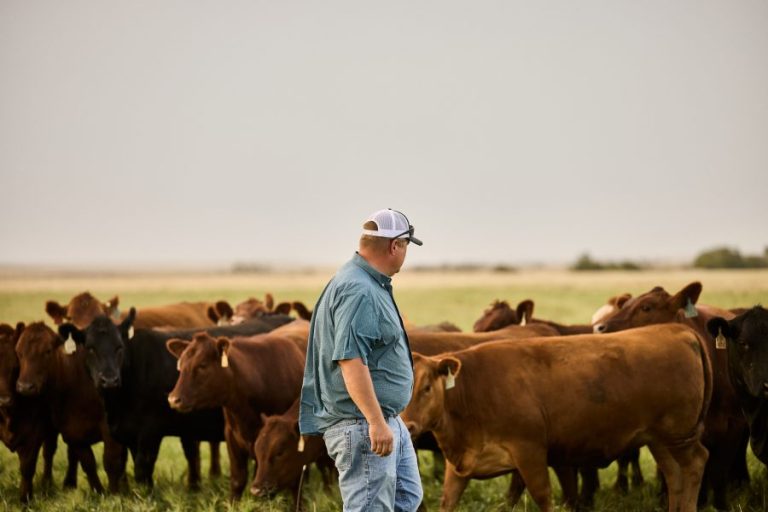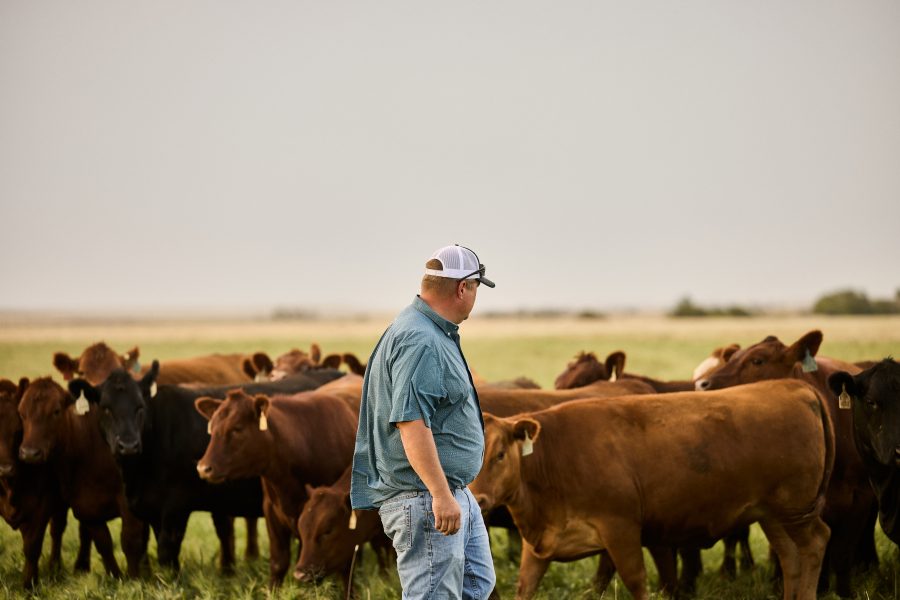LUSK WY – The Wasserburger family thrives on keen competition.
They bring an athletic intensity and drive that once won championships on the wrestling mat to now topping the charts in livestock auction ring. The 2022 Certified Angus Beef (CAB) Commercial Commitment to Excellence Award winners accepted the award at the brand’s Annual Conference Sept. 29 in Phoenix. They earned it with big wins in their herd’s maternal and marbling scorecards.
The ranch near Lusk, is led by JD and Laurie Wasserburger, with their sons Eric and Andrew and his wife, Anne, built on family legacies of pioneer great-grandfather Henry and his son, Henry Jr.
The 1916 homestead title started it all, where Henry spent the beginning years in a “soddy” of stacked native prairie adorned with a cowhide door flap. He passed the Bootheel 7 brand down to the son who began buying other area homesteads and grasslands. Henry Jr. built up the modern ranch with sheep and cattle that JD further diversified. They sold the sheep and JD started a freight company to serve the area’s oil and gas industry. His foresight paid off with two sons back on the ranch, proudly carrying the Bootheel 7 brand into its second century.
Like generations before, Eric and Andrew looked for every opportunity to build and buy. They added farming to the mix and most recently built a grow yard for another element of control in cattle marketing. The only way to keep tradition alive, they figure, is to allow it to change and evolve with a competitive edge. After all, it’s competition that drove Henry and JD to move the cow herd to an Angus base decades ago.
“It didn’t take sitting in many sale barns to see the black-hided calves were bringing more money,” JD says, looking back to when he returned to the ranch. Still, it was maternal traits rather than color that drove bull selection.
 “In this country, you just have to have cows that can do it themselves,” Andrew says, nodding across the wide, Wyoming prairie of big grasslands cut by deep coulees and rocky enclaves. “If she has bad feet, she’s not going to travel to water, she’s not going to travel to cake or mineral, which means she’s more likely to slough a calf or short him on nutrition. It just doesn’t work.”
“In this country, you just have to have cows that can do it themselves,” Andrew says, nodding across the wide, Wyoming prairie of big grasslands cut by deep coulees and rocky enclaves. “If she has bad feet, she’s not going to travel to water, she’s not going to travel to cake or mineral, which means she’s more likely to slough a calf or short him on nutrition. It just doesn’t work.”
He studies their performance records, willing the cows into a competition with one another.
“Those buyers come back every year because they understand what we’ve done to produce females here,” Andrew says. “We feel like if you do that job right, raising cows that will raise heifers that will raise the next generation, the steer calves will fall in right behind.”
Andrew points to one definitive training tool that helped the ranch grow to support several families.
“The use of technology is really what inspires me to keep moving forward, because you can actually measure progress on ranches now,” Andrew says. From range conditions to water use to breeding, feeding, carcass and nutrition, the technology offers a score board of progress.
About six years ago, the family got curious about how competitive their beef could be on the plate, too. They started ultra-sounding potential replacement heifers to gain a clearer picture of marbling ability and ribeye size and soon moved to scanning every heifer on the place. Sorting ensures every keeper has the targeted 1.1 square inches of ribeye per 100 pounds of body weight and an intramuscular fat (IMF) score over 3.5 – the threshold for Choice marbling.
This year, they invested in genomic testing for each heifer, with an even-more-detailed analysis of maternal, carcass and performance traits. Now they know exactly what the scorecard will show before they step into the ring.
“That’s the fine-tuning,” Andrew says. After sorting phenotypically for the top 500, they used the genetic data to sort by ribeye size, IMF score and weight.
That focus pays off. The Bootheel 7 steers handily won the Nebraska-based TD Angus Feed Test “Highest CAB Percentage” category two years in a row with pens at 64% and 65% CAB and 100% Choice or higher. They topped the Percentage Prime category, too.
Topping two out of five categories was an honor, a brief moment to glance at the scoreboard and be proud to see their name in lights.
“But we didn’t win ’em all; that means we still have a lot of work to do,” Eric says.












